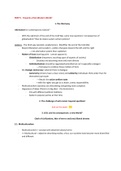Summary
Complete SUMMARY of PART V of 'Hisotry of Political Ideologies' (Ba1 Social Sciences, Prof. Dr. Zemni)
- Course
- Institution
This file contains a complete, organized and simplified summary of PART V of Prof. Dr. Zemni's extensive syllabus for his course 'History of Political Ideologies'. I got a 19/20 on this course making and using all parts of these summaries! This is ideal if you're looking for extra clarity, help and...
[Show more]



